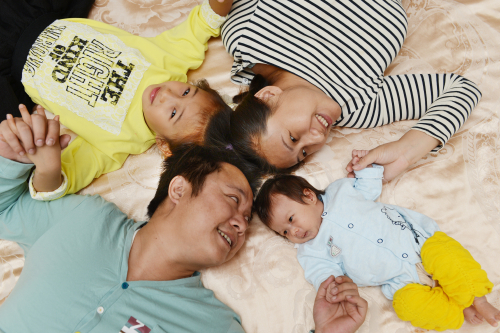|
 |
|
SWEET MOMENT: A couple in Shenyang, Liaoning Province, enjoys a family day with their two children on November 16, 2014 (CFP) |
The policy allowing urban parents to have a second baby, so long as at least one of them is an only child, has been implemented in China for about a year. People worrying the policy might create a rapid population surge can exhale a collective sigh of relief.
From March 3, 2014, when the policy was implemented across the country until the end of 2014, only 1 million couples eligible to have a second child applied to do so, according to a statement by Mao Qun'an, spokesman of the National Health and Family Planning Commission, during a press conference on January 12.
He said that this number is within the expectation that no more than 2 million children would be born every year under the policy.
Nationwide, 15 million to 20 million couples who are at child-bearing age and already have their first child are eligible to have a second child under the policy, said Zhai Zhenwu, a sociology professor with Renmin University of China and Vice President of the China Population Association.
That indicates that so far, only about 5 to 6 percent of these eligible couples in the country have submitted applications.
The 2014 was the first year that the policy was implemented, and it will take families some time to get ready for a second baby, so it is predicted that in 2015, more eligible couples will submit applications, Mao said.
Within expectations
The new policy was adopted in November 2013. It made a significant adjustment to the family planning policy introduced in the 1970s to curb the population explosion that China was experiencing at the time.
Before the introduction of the new policy, some exceptions to the one-child policy had already been made. Rural couples with a female or handicapped first child, families in which both parents are only children, and ethnic minority couples are also allowed to have second children.
The new policy will mainly affect urban couples at child-bearing age, Zhai said.
The policy was first implemented in east China's Zhejiang Province on January 17, 2014, and soon rolled out across the nation.
From January to the end of December 2014, Zhejiang received 88,056 applications, of which 85,648 were approved, according to the Health and Family Planning Commission of Zhejiang Province. During the 12 months, 26,974 babies were born to eligible couples there.
Pan Zuguang, an official in the Zhejiang provincial commission, said that a survey conducted in June 2014 showed the province had 632,300 eligible couples, and by the end of the year, 12 percent had submitted applications. He said that 85.68 percent of the female applicants were between 25 and 34 years old.
Before the policy was launched in the province, it was estimated that 95,000 couples would like to give birth to a second child in 2014, and in the first five years after the implementation of the policy, an annual average of 80,000-90,000 babies would be born under the policy, Pan said.
In the first half of 2014, a total of 310,000 babies were born in Zhejiang, only 3,401 of which were born to eligible couples under the new policy.
On January 11, 2015, the Beijing Municipal Commission of Health and Family Planning also released relevant data. At a press conference held on that day, the commission's spokesman Zhong Dongbo said that since Beijing implemented the policy on February 21, 2014, a total of 30,305 couples submitted application under the policy, and 28,778 applications were approved between then and December 30, 2014.
|
